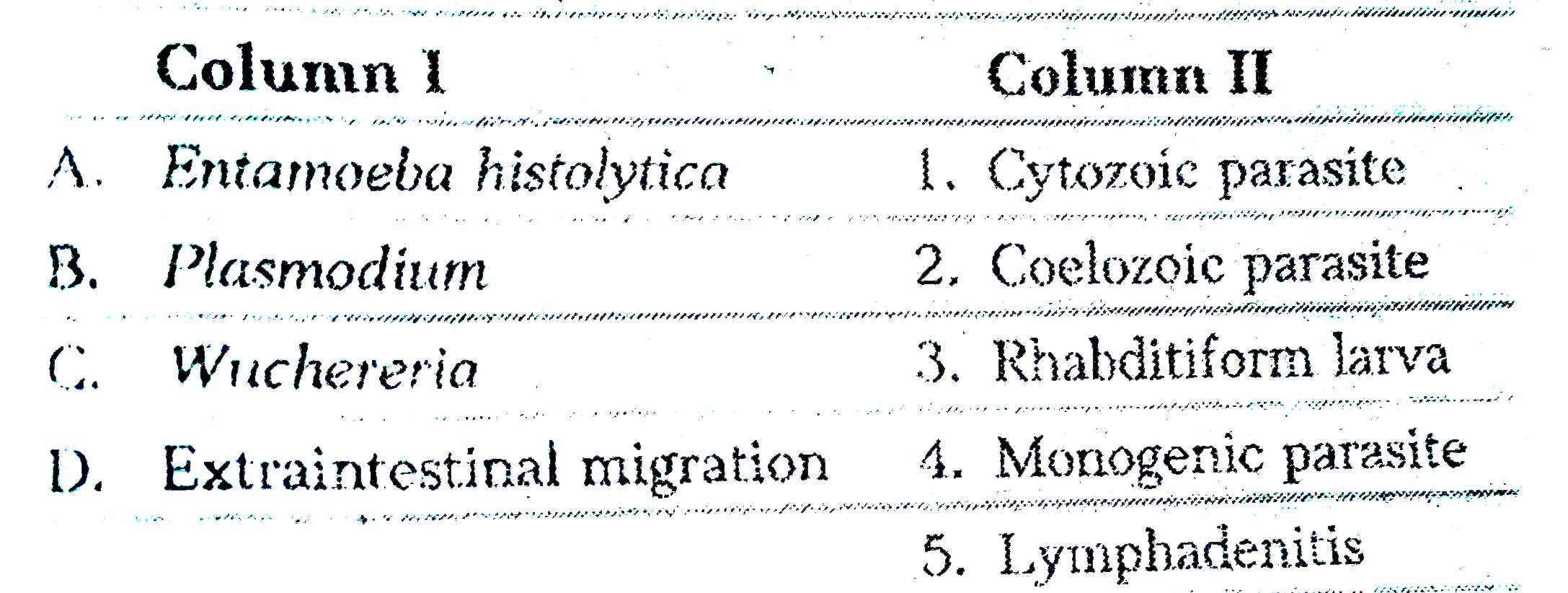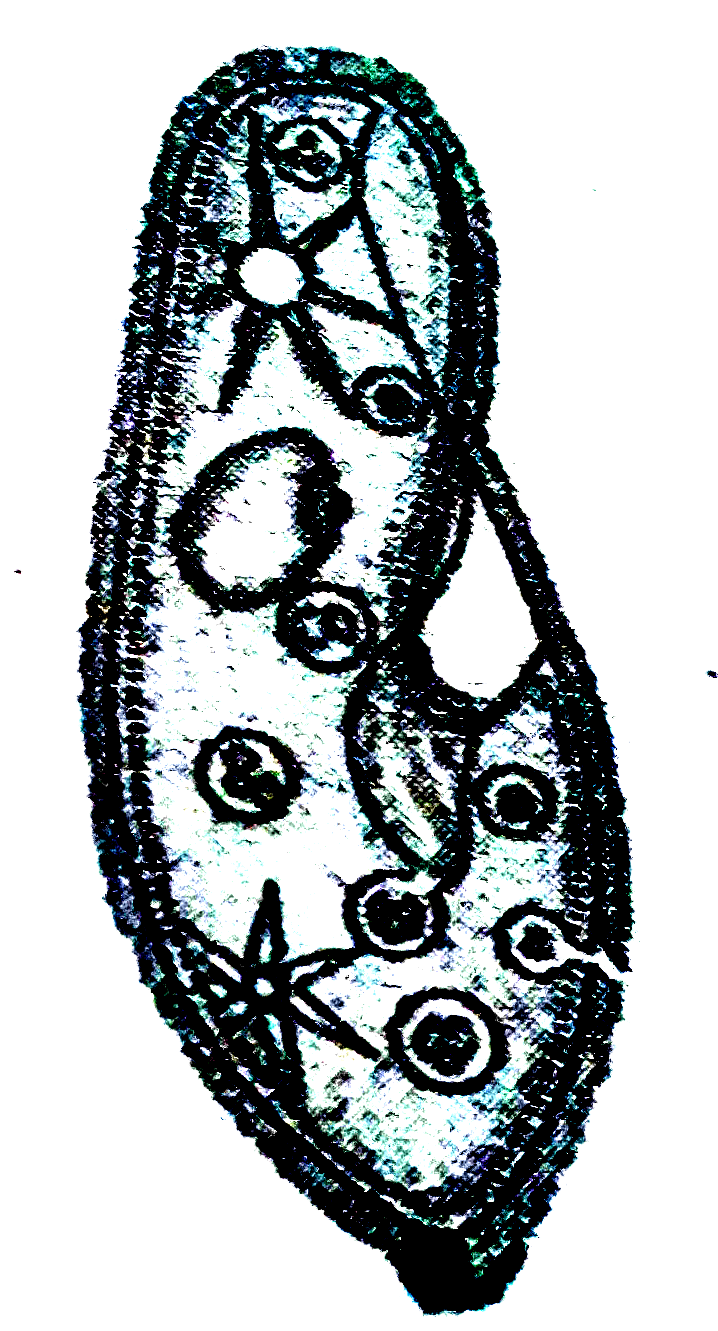Complete Solutions to CHAPTER EXERCISES ((C) MEDICAL ENTRANCES GALLERY (Collection of questions asked in NEET and in various Entrance Exams)) of chapter PROTISTA of Class 12 book with complete answers and questions
| Class 12 | BIOLOGY |
| Chapter | PROTISTA |
| ARIHANT NEET | CHAPTER EXERCISES ((C) MEDICAL ENTRANCES GALLERY (Collection of questions asked in NEET and in various Entrance Exams)) |
| Number Of Questions | 57 |
| Academic Year | 2023-24 |
Select the wrong statement.
View SolutionChrysophytes, Euglenoids, Dinoflaegellates and Slime moulds are included in the kingdom
View SolutionIdentify the characteristics features of diatoms
View SolutionGreen phytoplankton are kept in which kingdom of five kingdom classification system
View SolutionWhich is not a free living protozoan
View SolutionIn which group of organisms the cell walls form two thin overlapping shells which fit together
View SolutionMatch the following columns.

View SolutionWhich structure is formed at the time of time of exchange of gamete nuclei in given animal during sexual reproduction?

View SolutionWhich of the following is not correct with respect to malaria
View SolutionWhich of the following diseases is caused by a protozoan
View SolutionWhich group of organisms possesses a protein rich layer called pellcle
View SolutionSandfly play significant role in spreading kala azar bacause they
I. Suck blood only from the patients suffering from kala azar.
II. Covert amastigote into promastigote.
III. Engulf amastigote at the time of blood sucking from the infected persons.
IV. inject promastigote into the body of non-infected person at the time blood sucking.
View SolutionThe time interval of appearance of fever in the malaria patients depends on the types of malaria. The previous evidence suggest that such time interval are (1) 36 hours, (2) 48 hours and (3) 72 hours. If any such person experiences fever at an interval of 48 hours, then the petient suffer from
View SolutionThe mature infective stage of malaria parasite which is transferred from mosquito to man are
View SolutionWhich of the following does not belong to the kingdom Protista
View SolutionUnicellular algae, diatoms and protozoans are members of
View SolutionFrom the list below, select the group that includes protozoa, protistan algae and slime moulds
View SolutionProtista obtain their food as
View SolutionThese organisms are fungus like in one phase of their life cycle and Amoeba like in another phase of their life cycle
View SolutionWhich one single organism or the pair of organisms is correctly assigned to its or their named taxonomic group?
View SolutionMotile elongate zygote of Plasmodium occurs in
View SolutionExcretion in amoeba occurs through
View SolutionMacronucleus and micronucleus are the characteristic feature of
View SolutionWhat is true about Trypanosoma?
View SolutionThe methods of dispersal in amoeba is
View SolutionTriatoma infestans is the intermediate host in the life cycle of
View SolutionSchizogony occurs in
View SolutionWhich of the following is not matched correctly
View SolutionWhich one of the following is a characteristics feature of chryosophytes?
View SolutionWhere will you look for the sporozoites of malarial parasite ?
View SolutionWhich of the following is not a character of protista
View SolutionOrganisation found in Protista is
View SolutionWhich of the following is a flagellated protozoan
View SolutionThe disease caused by Trypanosoma is
View SolutionThe infective stage of Plasmodium to man is
View SolutionThe somatic phase of slime moulds lacks
View SolutionThe dinoflagellates which exhibit the phenomenon of bioluminescence are
View SolutionSporangium of acellular slime moulds is
View SolutionDiatomaceous earth is used in
View SolutionOsmoregulation in paramecium is a function of
View SolutionWhich is false for nutrition in Amoeba
View SolutionThe plasmodium of slime moulds which lacks veins is known as
View SolutionThe pigment which provides brownish tinge to diatoms is
View SolutionSlime moulds are ecologically
View SolutionSiliceous skeleton of diatoms is known as
View SolutionLife styles represented in protista are
View SolutionDiatoms frustule shell is made up of
View SolutionEntamoeba histolytica differs from Amoeba with absence of
View SolutionContractile vacuole in protozoan amoeba is meant for
View SolutionThe phenomenon of metaboly is exhibited by
View SolutionSingle - celled uninucleate form of slime moulds is
View SolutionMucilage propulsion occurs in
View SolutionMacrocyst formation occurs in cellular slime moulds during
View SolutionCarriers of Entamoeba histolytica are
View SolutionExflagellation in the life cycle of plasmodium occurs in
View SolutionMode of feeding in free living protozoans is
View SolutionTransverse binary fission occurs in
View Solution
CHAPTER EXERCISES ((C) MEDICAL ENTRANCES GALLERY (Collection of questions asked in NEET and in various Entrance Exams)) questions and complete solutions for chapter PROTISTA of ARIHANT NEET BIOLOGY (HINGLISH) of Class 12
All Exercises from ARIHANT NEET Class 12 BIOLOGY PROTISTA
- CHAPTER EXERCISES ((A) TAKING IT TOGETHER (Assorted questions of the chapter for advance level practice))
- CHAPTER EXERCISES ((B) MEDICAL ENTRANCES SPECIAL FORMAT QUESTIONS (Assertion and reason))
- CHAPTER EXERCISES ((B) MEDICAL ENTRANCES SPECIAL FORMAT QUESTIONS (Match the column))
- CHAPTER EXERCISES ((B) MEDICAL ENTRANCES SPECIAL FORMAT QUESTIONS (Statement based questions))
- CHAPTER EXERCISES ((C) MEDICAL ENTRANCES GALLERY (Collection of questions asked in NEET and in various Entrance Exams))
- CHECK POINT 5.1
- CHECK POINT 5.2
- CHECK POINT 5.3
- CHECK POINT 5.4